⚠ This limited offer ends in 6 hours 👀
✔100+ pages
✔ Written by industry pros
✔ Learn today's most lucrative and requested skill
👉 GRAB YOUR COPYWRITING GUIDE NOW
By entering your email you agree to subscribe to Thinqer's Tool Qit with loads of free resources.
Oh and don't worry, we don't spam.
Nobody likes spammers.
Introduction: The Digital Marketing Gold Rush
Welcome to the digital age’s frontier, and when it comes to learning the art of freelance digital marketing, the gold rush is entirely different from what you’ve heard in history books.
Here, we’re not sifting through riverbeds for gold. We’re mining the vast, virtual landscapes where the opportunities are limitless.
So, let’s go on a wild ride through the world of likes, shares, and viral content.
The landscape is rich, the competition fierce, but the rewards?
They’re huge for those, like you, who are ready to roll up their sleeves and dig deep.
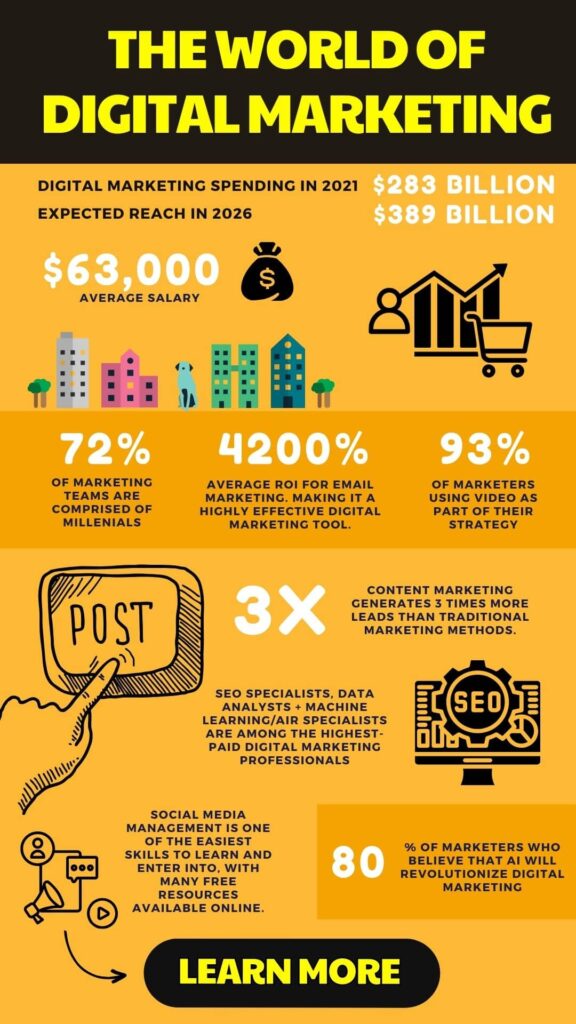
Decoding Digital Marketing: What’s the Big Deal?
Let’s kick things off by talking about why digital marketing is like the MVP of the business world today.
Imagine you’re at a huge party (online, of course), and digital marketing is the friend who introduces you to everyone.
It’s all about making sure people see what you’ve got to offer, whether it’s a product, a service, or just some really cool ideas.
Back in the day, getting noticed meant big signs, newspaper ads, or even blimps if you were really fancy.
Now, it’s all happening online.
From that Instagram ad that makes you laugh to the email that offers just what you’ve been looking for, digital marketing is behind the scenes, pulling the strings.
And here’s a little secret: It’s not just for the big players.
Digital marketing is a playground for everyone, from giant corporations to small businesses, and yes, even individuals like you and me.
It’s incredibly democratic; with the right approach, anyone can grab the spotlight.
So, what changed?
Well, the internet happened. It changed the game by making it easier to reach people. But not just any people—the right people.
The ones who are genuinely interested in what you have to say or sell. Digital marketing lets you be a needle-finding magnet in the haystack that is the internet.
Why should you care?
Because whether you’re looking to promote your handmade jewelry, grow your freelance writing business, or get the word out about your new café, digital marketing is your best bet to get noticed and attract customers. It’s about being smart and making sure your voice is heard over the din.
And guess what?
It’s not as hard as it sounds. Sure, there’s a bit to learn, but that’s where the fun begins. You don’t need a degree in marketing or a fat wallet. Just a bit of creativity, some basic tools, and a willingness to experiment and learn from your mistakes.
Digital marketing is your ticket to reaching your dreams, whether that’s financial independence, global fame, or just a little extra cash on the side. And the best part? You can start right where you are, right now.
In this guide, we’re going to cover everything you need to know to get started with digital marketing. From the basics of SEO and content marketing to the ins and outs of social media advertising, we’ll make it easy to understand and fun to learn. So, grab a coffee, settle in, and let’s get started on this adventure together. You’re about to discover just how exciting and rewarding digital marketing can be.
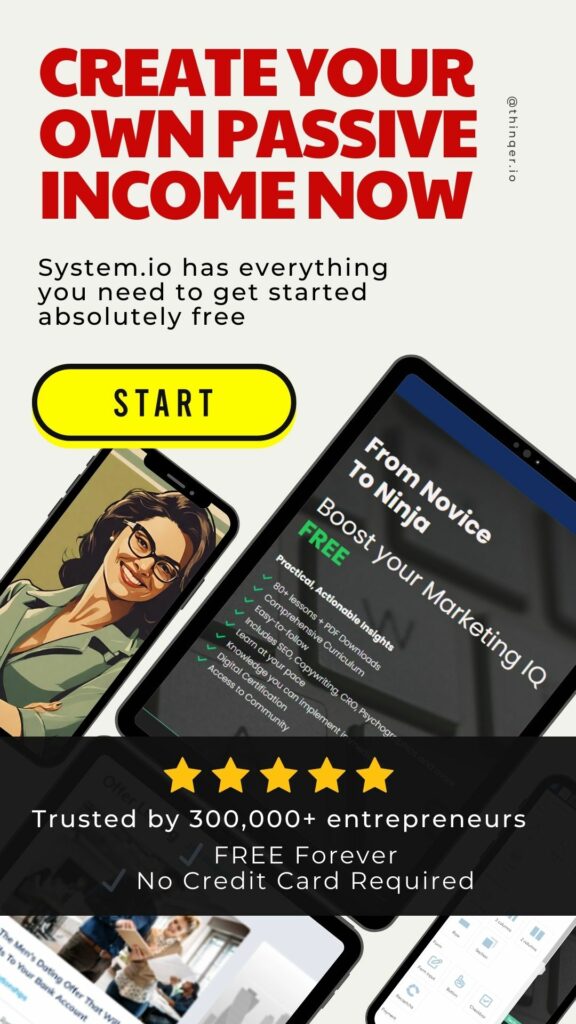
The Evolution of Marketing: From Billboards to Bots
Rewind a few decades, and the marketing world was all about who had the biggest billboard or the catchiest TV jingle. Fast forward to today, and the game has changed dramatically.
We’ve gone from billboards to bots, from newspaper ads to nuanced, targeted digital campaigns that meet the consumer exactly where they are: online.
This journey from traditional to digital marketing is not just about changing platforms; it’s about a fundamental shift in how we communicate.
Digital marketing has become the heartthrob of the entrepreneurial world, pumping life into businesses by connecting them with customers in ways that were previously unimaginable. It’s personalized, it’s direct, and it’s incredibly efficient.
What is Digital Marketing? Breaking Down the Buzz
So, what exactly is digital marketing?
Let’s cut through the jargon and get down to the basics. At its core, digital marketing is about using digital channels—like social media, email, search engines, and websites—to connect with current and potential customers.
It’s a broad field, encompassing everything from content marketing to SEO, PPC, and social media marketing.
But here’s the kicker: it’s everywhere you want to be and even places you don’t.
Every time you scroll through Instagram, check your email, or even search for a simple how-to video, digital marketing is playing a role in shaping your online experience.
It’s persuasive, pervasive, and incredibly powerful.
Digital marketing has democratized the marketing world. Now, even the smallest businesses can reach a global audience with a few clicks and a clever campaign.
It’s not just about selling products; it’s about telling stories, building relationships, and creating communities.
And the best part?
It’s accessible to anyone willing to learn the ropes.

The Freelance Digital Marketing Starter Kit
Learning how to get into freelance digital marketing might seem like deciphering an ancient code.
But don’t worry!
You’re about to discover it’s more like following a treasure map where X marks the spot of your future success.
This journey doesn’t require a backpack full of experience—just a sprinkle of curiosity and a dash of determination.
Let’s break down the essentials to kickstart your adventure in the digital marketing universe.
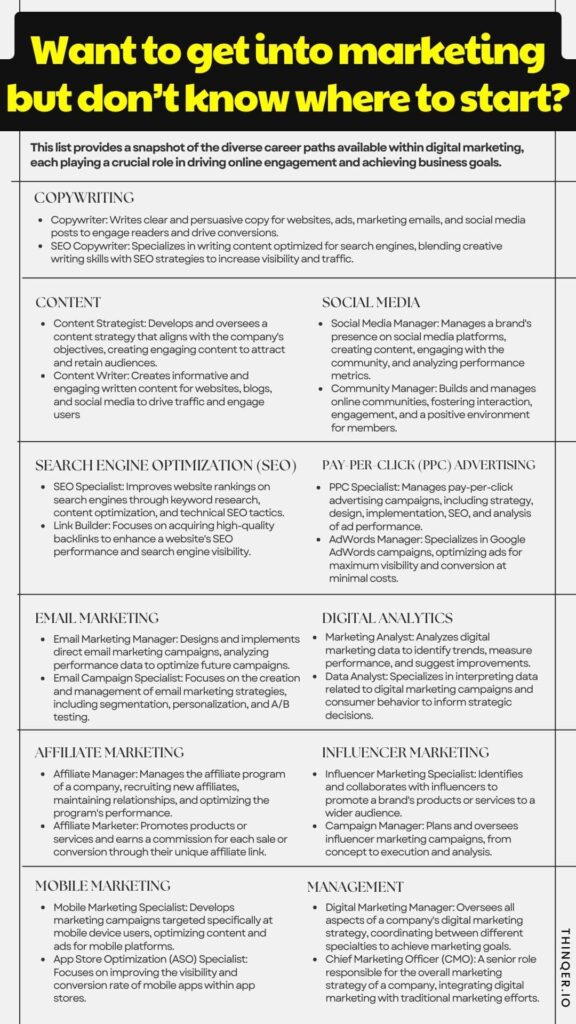
Getting Started in Digital Marketing: The First Steps
Imagine having the power to work from anywhere, choose your projects, and be your own boss.
Sounds dreamy, right?
But where do you begin?
First up, get cozy with the basics.
Understand what digital marketing involves: it’s a way to connect businesses and customers online through content, emails, search engines, and social media.
Start by exploring each area—read articles, watch tutorials, and follow experts on social media.
Next, create your own digital presence.
Start a blog, make a website, or jump onto social media platforms. Experimenting is key.
You’ll learn a ton by doing. Plus, having your own digital footprint is like handing out a digital business card. It’s proof you know your stuff.
Lastly, keep learning.
The digital world changes faster than the weather. Staying updated on the latest trends and tools is part of the job. Sign up for courses, attend webinars, and don’t be afraid to ask questions.
Remember, every expert was once a beginner.
The Essential Tools and Tech for Freelance Digital Marketing
Ready to look inside a digital marketer’s toolkit? It’s where creativity meets technology. Here’s a peek at the must-haves for casting those digital spells that captivate audiences and attract clients.
First off, get familiar with SEO tools. Tools like Google Analytics and SEMrush are like wands that help you understand what people are searching for online. They’re crucial for making sure your content gets seen by the right eyes.
Then, there’s social media management tools. Platforms like Hootsuite or Buffer are your best friends for scheduling posts, tracking engagement, and keeping all your social media ducks in a row.
Content creation is another biggie. Canva and Adobe Spark can turn you into a graphic design wizard, even if you’re all thumbs when it comes to art. And for writing, tools like Grammarly keep your content sharp and mistake-free.
Don’t forget about email marketing platforms like Mailchimp or ConvertKit. They’re your go-to for crafting and sending newsletters that people actually want to read.
Lastly, project management tools like Trello or Asana can keep you sane, especially when juggling multiple clients or projects. They help you stay organized, meet deadlines, and communicate with clients like a pro.

The Power of Personal Branding in Freelance Digital Marketing
What is Personal Branding?
At its core, personal branding is the practice of marketing yourself and your career as brands.
It’s an ongoing process of establishing a prescribed image or impression in the mind of others about an individual, group, or organization.
In freelance digital marketing, personal branding sets you apart from the competition, showcasing your unique skills, experiences, and personality.
Why It’s Crucial for Success
Personal branding has propelled many freelancers to new heights of success.
It helps in:
- Establishing Credibility: A strong personal brand showcases your expertise, making you a trusted figure in your field.
- Attracting Ideal Clients: By communicating your unique value proposition, you attract clients aligned with your skills and values.
- Enhancing Online Visibility: A well-crafted personal brand improves your visibility in search engines and on social media platforms.
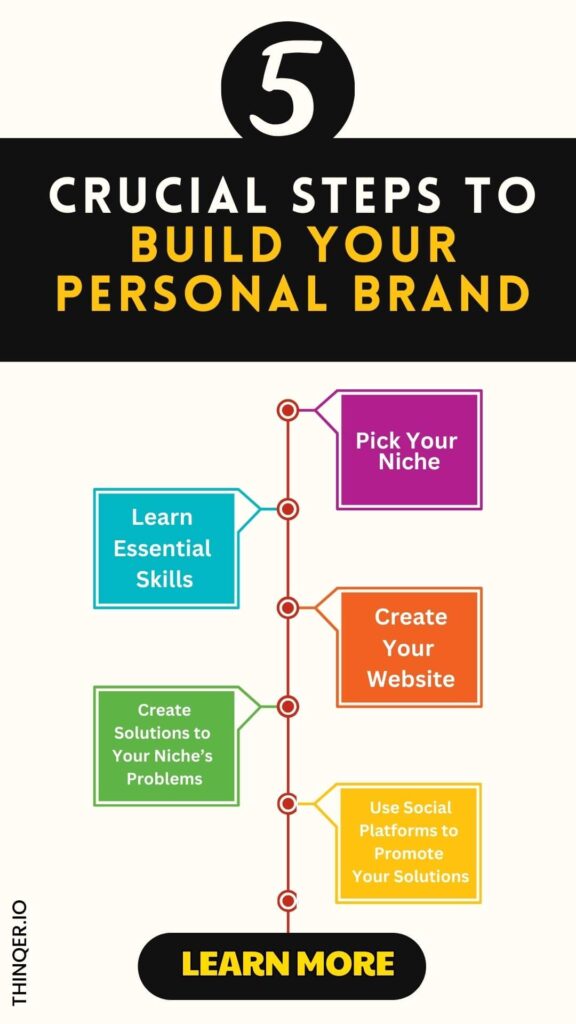
How to Build Your Personal Brand from Scratch
Exploring the landscape of personal branding in digital marketing unveils a rich tapestry of professionals who have mastered the art of standing out in a crowded digital space.
On LinkedIn, marketing thought leaders like Gary Vaynerchuk exemplify how a well-crafted profile and consistent, valuable content sharing can transform a professional identity into a compelling personal brand.
Their approach combines in-depth summaries, regular insightful posts, and active engagement to not just showcase their expertise but to build a community around it.
Meanwhile, on Twitter, SEO experts such as Rand Fishkin demonstrate the power of real-time engagement and sharing of industry knowledge, proving that valuable, timely content paired with genuine interactions can elevate one’s professional stature significantly.
Why Consistency is Key in Freelance Digital Marketing
Turning to YouTube, content creators like Neil Patel offer a visual and in-depth approach to digital marketing education, making complex topics accessible and engaging.
Through high-quality videos and a consistent posting schedule, they leverage their personality and expertise to not just educate but also entertain, thereby cementing their personal brand in the minds of their audience.
Similarly, platforms like Medium serve as a canvas for digital marketers and writers, including Seth Godin, to share longer-form thought leadership pieces.
Through compelling narratives and insights, these professionals use storytelling to connect with readers on a deeper level, illustrating the profound impact of personal anecdotes and a strong, authentic voice in building a personal brand.
These examples across various platforms underscore the essence of successful personal branding in the digital marketing world: a blend of authenticity, expertise, and strategic engagement.
By observing and learning from these professionals, aspiring digital marketers can glean valuable lessons on how to craft and communicate their unique value proposition, build a community around their brand, and ultimately stand out in a competitive field.
Step 1: Define Your Brand
- Identify Your Niche: Pinpoint what you’re passionate about and where you excel.
- Understand Your Audience: Know whom you’re talking to, their needs, and how you can solve their problems.
- Craft Your Brand Message: What message do you want to convey? Ensure it’s clear, concise, and consistent across all platforms.
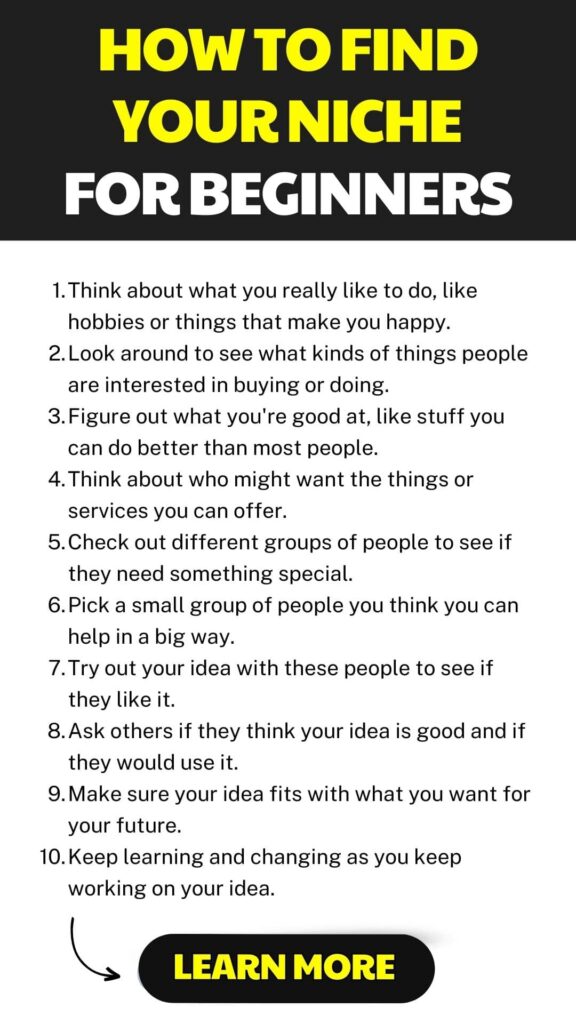
Step 2: Build Your Online Presence
- Create a Professional Website: Your website is your digital home. Platforms like Systeme.io offer free tools to build a professional-looking site without needing technical skills.
- Be Active on Social Media: Choose platforms where your target audience hangs out. Share valuable content, engage with your followers, and showcase your expertise.
Remember, the money is in the list. What list? Your email list.
So, it’s important that you know what to do with your followers.
Don’t let them get away, discover the potential of email marketing, content strategy, and social media to find your niche.
Step 3: Deliver Value
- Content Creation: Start a blog, record podcasts, or create videos that provide value to your audience. Systeme.io can help you manage and distribute your content efficiently.
- Network: Attend industry events, join online forums, and connect with other professionals. Networking is key to building your brand’s reach.
Step 4: Monetize Your Brand
- Offer Your Services: Use your personal brand to highlight your freelance services. Systeme.io can facilitate this with features for email marketing, payment processing, and more.
- Create Digital Products: E-books, courses, and webinars can be sold directly through your website on Systeme.io.
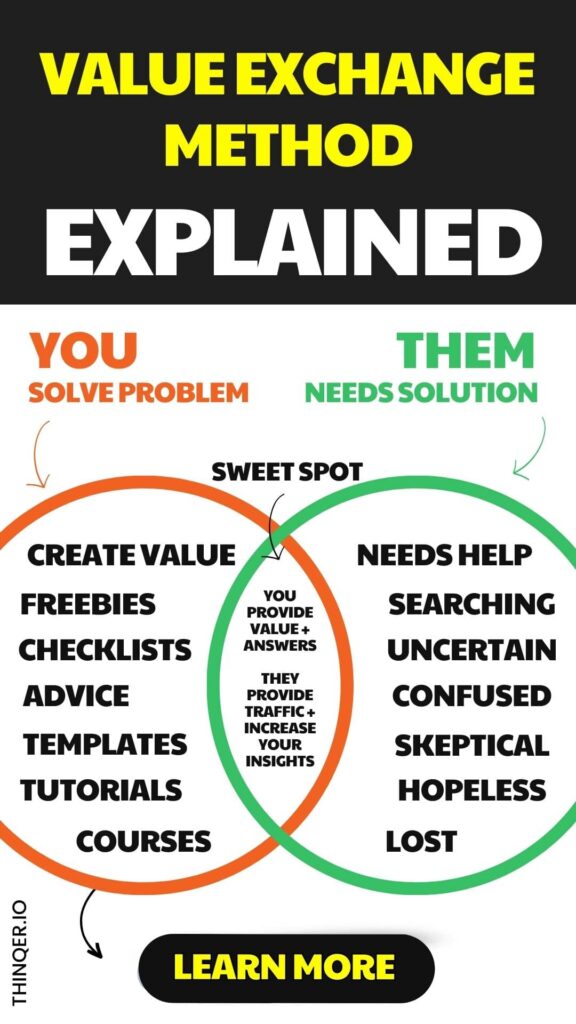
What Income can You Expect to Earn?
Personal branding is a marathon, not a sprint. Initially, your focus should be on building your brand and audience. However, with consistent effort:
- First Few Months: You might start seeing small projects or gigs. The goal is to get testimonials and build your portfolio.
- After 6 Months: As your brand grows, so should your client base. You can expect a steady flow of projects and perhaps start selling digital products.
- After a Year: With a solid personal brand, expanded network, and client base, you could potentially see a significant increase in income. Diversifying your income streams through courses, consulting, or speaking gigs can further boost your earnings.
Is Personal Branding Right for You?
Personal branding is invaluable for anyone serious about building a long-term career in freelance digital marketing.
It requires time, effort, and consistency, but the rewards—increased visibility, credibility, and income—are well worth it.
With free tools like Systeme.io, starting your personal branding journey is easier and more affordable than ever.
Remember, your personal brand is a reflection of who you are and what you stand for.
It’s about making a meaningful connection with your audience and delivering value every step of the way.
If you’re ready to take control of your freelance career, personal branding is the way to go.
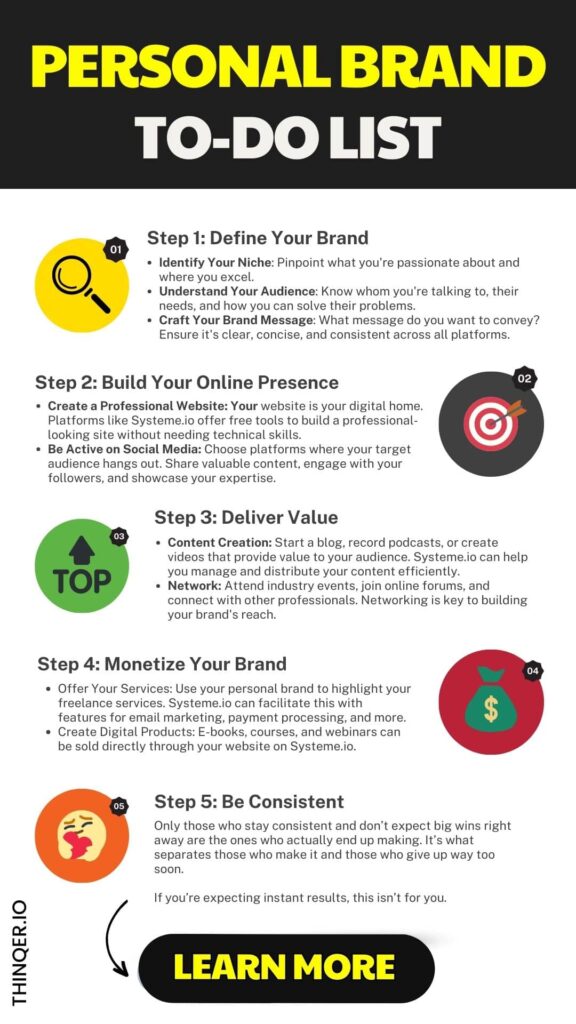
The Spectrum of Freelance Digital Marketing Roles
The world of freelance digital marketing is as huge.
Within this expansive field, numerous roles cater to different skills, interests, and creative passions.
From the artistry of content creation to the analytical prowess required for SEO and SEM, let’s explore the core roles that make digital marketing a dynamic and diverse career path.
Content Creation: The Art of Digital Storytelling
In the digital age, content is king. But not just any content—it needs to be engaging, informative, and, most importantly, storytelling that connects on a human level.
Content creators are the modern-day bards of the internet, weaving tales that captivate and convert audiences.
They’re the pied pipers of the freelance digital marketing, leading followers through narratives that not only inform but also inspire action.
Whether it’s blog posts, videos, infographics, or podcasts, each piece of content is a thread in a larger tapestry that tells the brand’s story.
This role demands creativity, a keen understanding of audience needs, and the ability to craft messages that resonate across different platforms.
For those looking to enhance their storytelling skills, resources like “Unveiling the Power of Copywriting in Freelance Digital Marketing” on Thinqer.io can offer valuable insights.
Additionally, exploring platforms like Canva for design and Anchor for podcasting can help bring your stories to life.
SEO and SEM: The Wizards Behind the Curtain
Search Engine Optimization (SEO) and Search Engine Marketing (SEM) are the unsung heroes of the digital marketing world.
These roles focus on increasing visibility in search engine results, ensuring that your content not only reaches its intended audience but also drives action. SEO and SEM specialists are like wizards behind the curtain, fine-tuning the machinery of the internet to spotlight your brand.
This magic involves a mix of keyword research, content optimization, link building, and paid advertising campaigns.
The goal?
To rank higher on search engine results pages (SERPs) and capture the attention of potential customers at the moment they’re searching for solutions.For those new to SEO and SEM, starting with the basics is key.
Resources such as “Understanding EEAT Rules for Google Ranking” on Thinqer.io can provide a solid foundation.
Moreover, tools like Google Analytics, SEMrush, and Google Ads are essential instruments in your SEO and SEM toolkit, helping to decipher the algorithms’ secrets and put your content front and center.
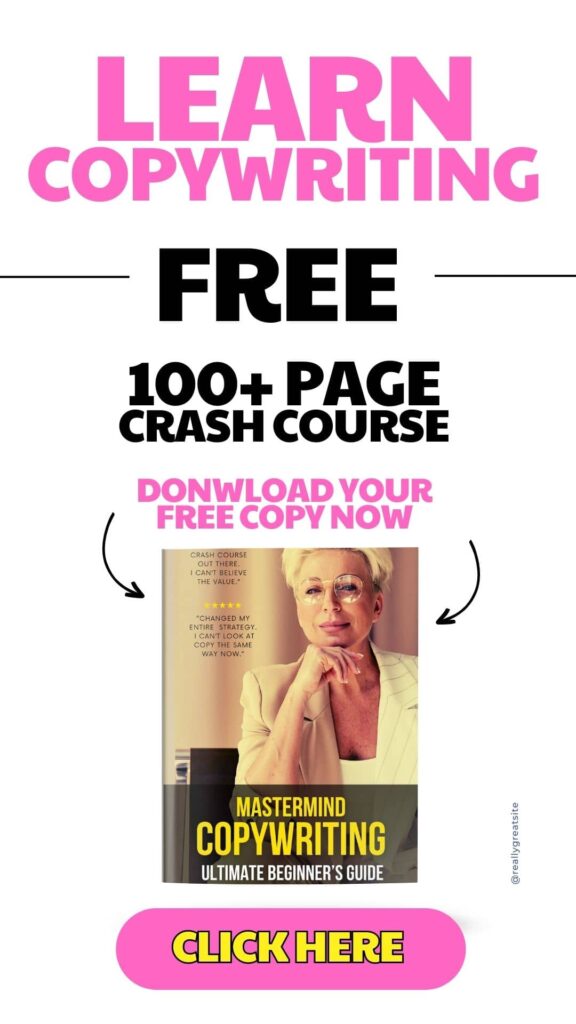
SEO Explained: The Secret Recipe for Being Found Online
Imagine the internet is a huge library, and your website is a book in it.
Now, SEO is like the library’s filing system that helps people find your book among millions of others. If you use the right labels and organize your book correctly, more people will find and read it.
That’s what SEO does—it helps your website stand out so more people can find it easily when they’re searching online.
What is SEO?
SEO stands for Search Engine Optimization.
It’s a bunch of steps you can take to make your website more attractive to search engines like Google.
It’s like when you clean up your room and put everything in its right place, so it’s easy for you to find your toys.
When your website follows SEO rules, search engines can easily understand what your website is about, and they’re more likely to show it to people searching for the things you talk about or sell.
Why is SEO Important?
Imagine you’re at a huge party with hundreds of people, and you want to make new friends but don’t know how to get noticed.
SEO is like having a big, shiny balloon that says, “Hey, I’m here, come talk to me!”
It helps your website get noticed on the big internet party, so more visitors come to your site, which could mean more people buying what you’re selling or reading your stories.
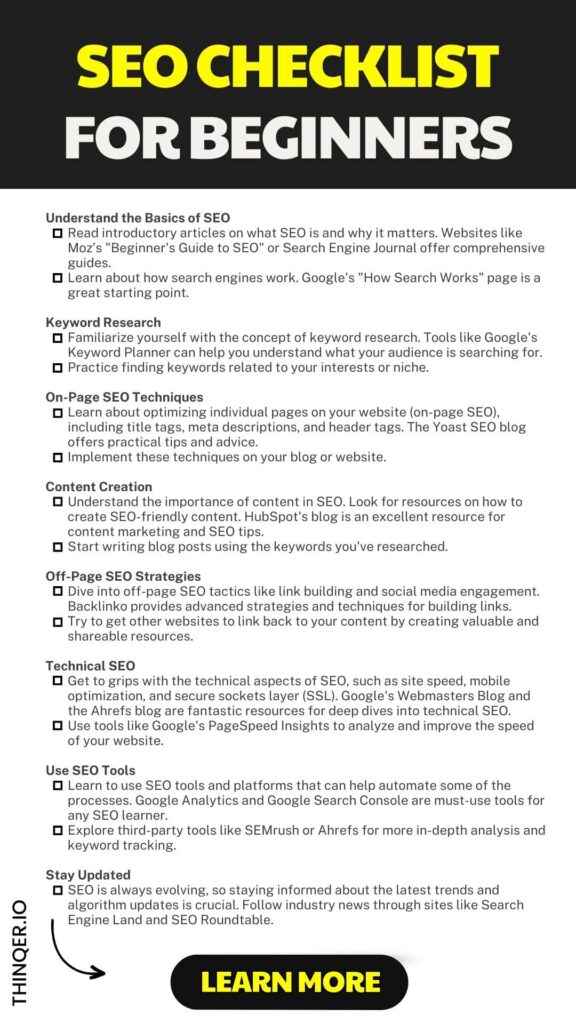
Learning SEO on Your Spare Time
Now, learning SEO is like learning to ride a bike. At first, it might seem tricky, but with a bit of practice, you’ll get the hang of it.
And guess what? You can learn it in your spare time!
There are lots of free resources and tools online that can guide you step by step.
Freelance Digital Marketing and the Pizza Shop
Think of the internet as a town full of pizza shops, and you’ve just opened your own. SEO is the secret recipe that makes your pizza (website) the one everyone wants to try.
It involves choosing the right ingredients (keywords), a welcoming sign (meta tags), and telling everyone where to find you (local SEO).
As more people enjoy your pizza and tell their friends about it (share your website), your shop becomes the most popular in town (ranks higher on search engines).
How SEO Can Increase Your Earnings
It really sounds more complicated than it really is.
But once you’ve got the hang of SEO, it’s like having a magic key that opens doors to new opportunities.
With more people visiting your website, you’re not just making it popular; you’re also opening up chances to make more money.
Whether you’re selling products, offering services, or just sharing your knowledge, SEO can help you reach more people who are interested in what you have to offer.
This can lead to more sales, more clients, and yes, increased earnings like you’ve never imagined.
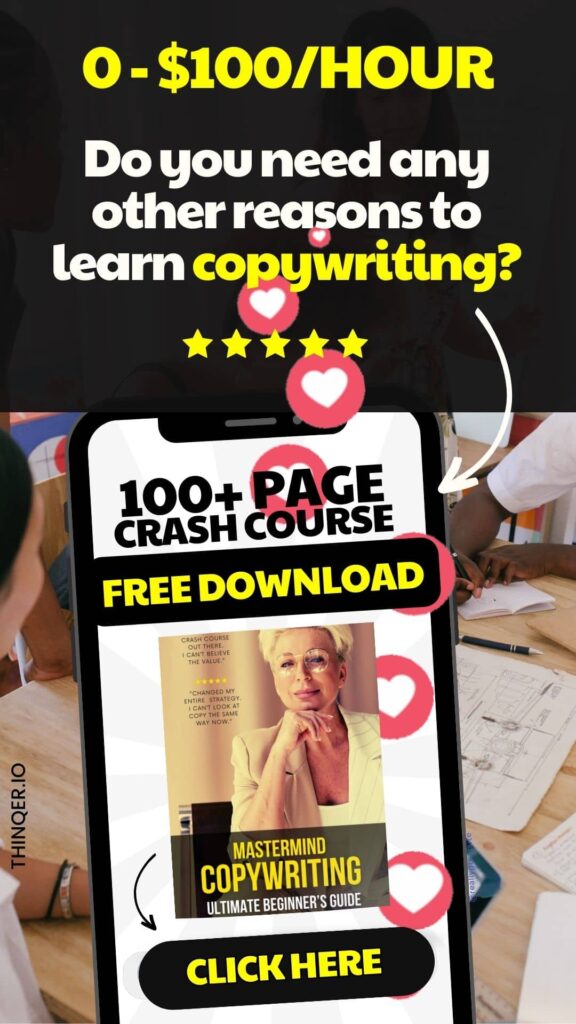
SEO Learning Checklist: Freelance Digital Marketing for Beginners
- Understand the Basics of SEO
- Read SEO articles on websites like Moz’s “Beginner’s Guide to SEO” or Search Engine Journal offer comprehensive guides.
- Learn how search engines work. Google’s “How Search Works” page is a great starting point.
- Keyword Research
- Familiarize yourself with keyword research. Tools like Google’s Keyword Planner can help you understand what your audience is searching for.
- Practice finding keywords related to your interests or niche.
- On-Page SEO Techniques
- Learn about optimizing individual pages on your website (on-page SEO), including title tags, meta descriptions, and header tags. The Yoast SEO blog offers practical tips and advice.
- Implement these techniques on your blog or website.
- Content Creation
- Look for resources on how to create SEO-friendly content. HubSpot’s blog is an excellent resource for content marketing and SEO tips.
- Write blog posts using the keywords you’ve researched.
- Off-Page SEO Strategies
- Learn off-page SEO tactics like link building and social media engagement. Backlinko provides advanced strategies for building links.
- Try to get other websites to link back to your content by creating valuable and shareable resources.
- Technical SEO
- Learn the technical aspects of SEO, such as site speed, mobile optimization, and secure sockets layer (SSL). Google’s Webmasters Blog and the Ahrefs blog are fantastic resources for technical SEO.
- Use tools like Google’s PageSpeed Insights to analyze and improve the speed of your website.
- Use SEO Tools
- Learn to use SEO tools and platforms that can help automate some of the processes. Google Analytics and Google Search Console are must-use tools for any SEO learner.
- Explore third-party tools like SEMrush or Ahrefs for more in-depth analysis and keyword tracking.
- Stay Updated
- SEO is always evolving, so staying informed about the latest trends and algorithm updates is crucial. Follow industry news through sites like Search Engine Land and SEO Roundtable.
Resources to Explore: Get Started in Freelance Digital Marketing
- CoMoz’s Beginner’s Guide to SEO: A comprehensive starting point for understanding the fundamentals of SEO. Visit Moz’s Guide.
- Google’s Keyword Planner: Essential for keyword research, helping you find the right keywords to target. Access via Google Ads Keyword Planner.
- Yoast SEO Blog: Offers practical tips on implementing on-page SEO techniques. Explore Yoast’s Blog.
- HubSpot Blog: Provides insights into creating content that ranks well on search engines. Check out HubSpot’s Marketing Blog.
- Backlinko: Great for learning advanced link-building strategies. Learn from Backlinko.
- Google’s Webmasters Blog: Official advice on technical SEO and staying compliant with Google’s guidelines. Visit Google’s Webmaster Central Blog.
- Google Analytics: Essential tool for any digital marketer or SEO professional to understand website performance. Sign up or log in at Google Analytics Academy.
- Google Search Console: Another crucial tool for monitoring and optimizing website performance. Get started with Google Search Console.
Navigating the Freelance Digital Marketing Landscape
In the ever-expanding universe of freelance digital marketing, carving out your unique space is both an art and a science.
Beyond mastering the tools and tactics, two critical elements play pivotal roles in your success: building a compelling personal brand and strategically networking within your chosen niche.
Let’s explore how these components can elevate your freelance journey, making you the go-to expert in your field.
Building Your Brand: The Freelance Digital Marketing Guide to Standing Out
In a sea of freelance digital marketing, your personal brand is your beacon. It’s what makes you unmistakable amidst the waves of competition.
Crafting a personal brand that shines isn’t just about having a slick website or a catchy tagline (though those help); it’s about embodying the unique value you bring to the table. It’s your story, your style, and how you make people feel.
Start by defining what sets you apart. Are you a content marketing wizard with a knack for viral posts? Or maybe an SEO guru who can skyrocket website rankings?
Whatever your superpower, own it.
Then, communicate it consistently across all your digital touchpoints—from your social media profiles to your email signature.
A tool like Systeme.io can be instrumental in this process.
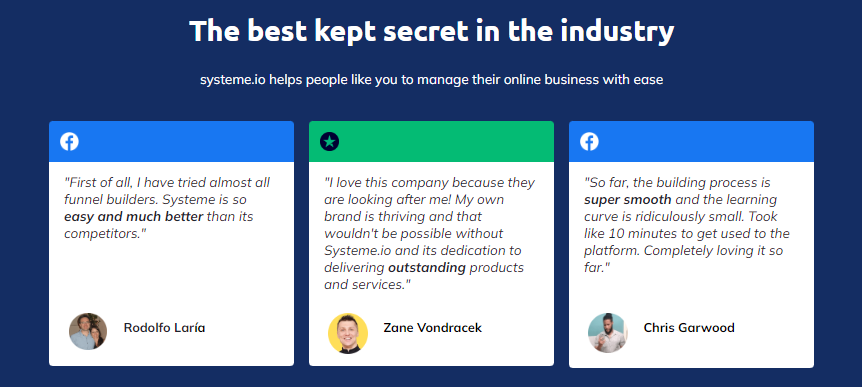
With its easy-to-use website builder, email marketing, and funnel creation features, Systeme.io helps you craft a powerful online presence that captures your brand essence and engages your target audience.
And the very best part about it, apart from the fact that it is the most user-friendly, the basic are FREE and they are all you need to get started.
Networking and Niche Mastery: The Dynamic Duo
Finding success as a freelance digital marketer isn’t just about what you know; it’s also about who you know and where you focus your efforts.
The magic happens when you combine effective networking with niche mastery.
Being a big fish in a small pond isn’t just a quaint idiom—it’s a strategy that can lead to higher visibility, stronger relationships, and more targeted opportunities.
First, pinpoint your niche.
Whether it’s eco-friendly businesses, tech startups, or health and wellness, narrowing your focus can make you the go-to expert in that area.
Then, dive into networking.
Attend industry webinars, join relevant forums and groups, and don’t shy away from social media. Tools like LinkedIn are invaluable for connecting with peers and potential clients.
But networking isn’t just about collecting contacts; it’s about building genuine relationships.
Share your knowledge, offer value, and be genuinely interested in others.
Remember, in the tight-knit world of niche marketing, reputation is everything.
To manage your growing network and niche marketing campaigns, consider leveraging Systeme.io’s CRM and email marketing capabilities.
These tools can help you keep track of your contacts, personalize your outreach, and nurture relationships at scale.
From Learning to Earning: Monetizing Your Digital Marketing Skills
Transitioning from acquiring digital marketing skills to monetizing them is a thrilling phase of your freelance journey.
It’s where your hard work starts to pay off, literally.
However, the path from learning to earning is paved with strategic decisions, particularly around pricing your services and landing your first client.
Let’s get into these critical steps, ensuring you’re well-equipped to turn your digital marketing prowess into profit.
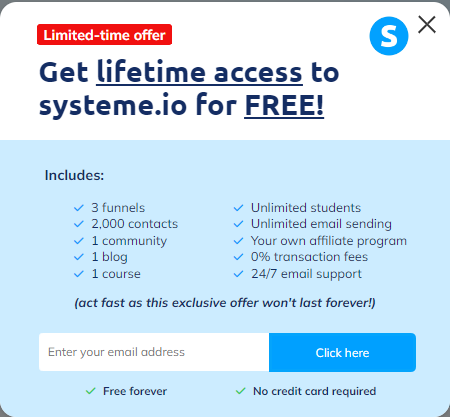
The Pricing Puzzle: How Much to Charge for Your Freelance Digital Marketing Magic
Determining how much to charge for your digital marketing services can feel like navigating a labyrinth. Price too high, and you risk scaring off potential clients.
Too low, and you may not meet your financial goals or could undervalue your services. The key is finding that sweet spot where your rates reflect the value you deliver and align with market standards.
Start by researching what others in your niche are charging for freelance digital marketing services. Websites like Glassdoor and PayScale can provide insights into industry standards.
Consider factors like your experience, the complexity of the project, and the potential ROI for the client. It’s also helpful to offer different pricing models, such as hourly rates for smaller tasks and project-based fees for comprehensive campaigns.
Another great strategy is to create package deals.
For instance, instead of a flat fee for all social media services, offer tiered packages that clients can choose based on their needs and budget.
This approach not only makes your services accessible to a broader range of clients but also simplifies the decision-making process for them.
Landing Your First Client: A Freelance Digital Marketing Rite of Passage
Securing your first client is a milestone in any freelancer’s career.
It’s a testament to your skills, determination, and the effectiveness of your marketing strategy. Begin by crafting a compelling portfolio that showcases your best work.
Platforms like Behance and LinkedIn are excellent for displaying your projects and networking with potential clients.
Why Networking is Crucial in Freelance Digital Marketing
Attend industry meetups, webinars, and conferences (both virtual and in-person) to meet potential clients and fellow marketers.
Join digital marketing groups on social media platforms and participate in discussions.
Not only does this increase your visibility, but it also establishes you as a knowledgeable and active member of the digital marketing community.
Cold outreach can also be effective. Use tools like Hunter.io to find email addresses of potential clients in your niche.
Craft personalized, concise, and clear emails that highlight how you can solve their specific problems. Remember, persistence is key, but always be respectful and professional.
Finally, consider offering a free mini-service or audit as a way to demonstrate value upfront.
This can be a social media strategy review or a brief SEO analysis. It’s a powerful way to build trust and showcase your expertise, making it easier to transition the conversation to a paid engagement.
Freelance Digital Marketing Success Stories
The journey of a freelance digital marketer is filled with potential for remarkable achievements and transformative impacts.
These success stories not only serve as inspiration but also as tangible proof of digital marketing’s power.
Here, we explore two captivating case studies: a local bakery that captured hearts and went viral, and a freelancer who harnessed digital marketing to become a brand in their own right.
Case Study: The Local Bakery Goes Viral
Imagine a small bakery nestled in a cozy corner of a bustling town. Its secret recipes have been passed down through generations, but its charm remained a local treasure until digital marketing stepped in.
The bakery’s journey from obscurity to viral fame began with a simple yet strategic digital marketing plan focusing on storytelling, social media engagement, and community building.
The bakery started sharing behind-the-scenes videos of baking processes, the stories behind their special recipes, and the faces of the people who made every pastry possible.
They utilized platforms like Instagram and Facebook to showcase their mouth-watering offerings, complemented by local SEO strategies to capture the attention of anyone searching for a sweet treat nearby.
The turning point came when they launched a campaign inviting customers to share their own memories and moments associated with the bakery’s goods.
This user-generated content campaign exploded on social media, leading to widespread recognition and even features in local and national media outlets.
The bakery’s online presence transformed it into a must-visit spot, significantly boosting sales and establishing a brand that resonates with warmth, tradition, and community.
Case Study: The Freelancer Who Became a Brand
This story begins with a freelancer armed with digital marketing skills and a vision to stand out in a crowded market.
Starting with freelance digital marketing projects, this individual focused on building a personal brand that highlighted unique expertise, a distinctive voice, and an unwavering commitment to delivering value.
By consistently sharing insightful content, engaging with their audience on social media, and leveraging SEO and content marketing, the freelancer began to attract a larger audience.
They offered webinars and e-books, further establishing their authority in the field.
Collaborations with established brands and contributions to well-known publications increased visibility, while strategic networking led to speaking opportunities at industry events.
Over time, this freelancer’s name became synonymous with expertise in their niche.
They transitioned from offering freelance services to consulting, mentoring, and creating online courses, effectively becoming a brand.
Their journey showcases the power of personal branding, quality content, and strategic digital marketing in building a sustainable, diversified business model that transcends traditional freelancing.
The Future of Freelance Digital Marketing
The world of freelance digital marketing is ever-evolving, with new technologies and trends constantly reshaping the landscape.
As we look to the future, it’s clear that the industry is moving towards more personalized, efficient, and intelligent strategies.
Let’s get into the trends that are set to define the future of freelance digital marketing and explore how professionals can adapt to stay ahead.
Emerging Trends and Technologies for Freelance Digital Marketing
As we peer into the digital marketing crystal ball, several key trends emerge, signaling a shift towards more sophisticated and user-centric approaches.
Here’s a snapshot of what’s on the horizon:
- Artificial Intelligence and Machine Learning: AI and ML are making digital marketing smarter by enabling hyper-personalized content delivery and predictive marketing. Tools powered by AI will become essential in crafting strategies that anticipate customer needs.
- Voice and Visual Search: With the rise of smart speakers and visual search technologies, optimizing for voice and visual queries will become crucial. This means adapting SEO strategies to be more conversational and image-focused.
- Interactive Content: From quizzes to augmented reality experiences, interactive content is set to engage audiences in new and exciting ways, offering personalized and immersive experiences that boost engagement.
- Data Privacy and Security: As consumers become more conscious of their digital footprints, transparent data practices and enhanced security measures will be vital in building trust and loyalty.
- Sustainability in Freelance Digital Marketing: The growing emphasis on sustainability will see marketers adopting greener practices and highlighting eco-friendly aspects of their products or services.
Adapting and Thriving in a Changing Digital Landscape
To not just survive but thrive in the dynamic world of digital marketing, freelancers must embrace adaptability and continuous learning.
Here’s how you can ride the waves of change:
- Stay Educated: Keep abreast of industry trends and technologies by following reputable digital marketing blogs, attending webinars, and participating in online courses.
- Embrace New Tools: Experiment with emerging digital marketing tools and platforms to find new ways to connect with audiences and streamline workflows.
- Focus on Personalization: Use data analytics to understand your audience better and tailor your marketing efforts to their preferences and behaviors.
- Prioritize Data Privacy: Be transparent about your data collection practices and ensure your marketing strategies comply with privacy regulations.
- Incorporate Sustainability: Consider how your marketing practices can reflect a commitment to sustainability, whether through the content you create or the campaigns you run.
By staying informed about these trends and being willing to adapt your strategies, you can position yourself as a forward-thinking freelancer ready to tackle the future of digital marketing.
The key to success lies in your ability to anticipate changes, harness new technologies, and deliver exceptional value to your clients in a world where digital marketing is constantly evolving.
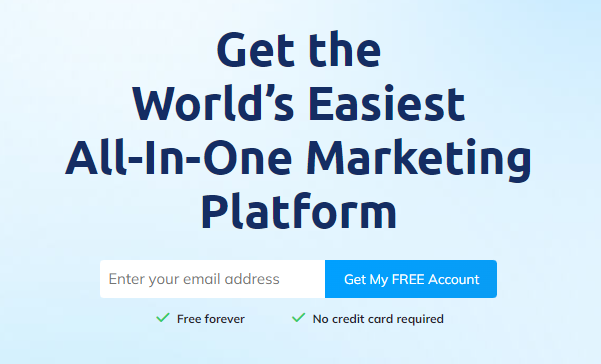
* Crafted with an unwavering dedication to honesty, this article is a product of our independent efforts. But heads up: it’s only sprinkled with affiliate links to products we truly standby. So, if you decide to shop through them, we might get a little thank you commission at no extra charge to you. Think of it as your way of giving us a virtual high-five!
People who read this also read:
- The Best Work-From-Home Jobs with No Phone Calls
- My Battle between Marketing and Manipulation: The Blurred Lines
- The Icy Rise of Frozen Snacks: Convenience at What Cost?
- Gen Z’s Mental Health Crisis: The Alarming Truth
- Inside China’s Unstoppable Rise: Lessons for Entrepreneurs


This is one of the best posts I’ve read in quite a while. Good work.
Hello there! Would you mind if I share your blog with my myspace group? There’s a lot of folks that I think would really enjoy your content. Please let me know. Many thanks
[…] those of you ready to get into this lucrative industry, check out How to Start Freelance Digital Marketing. It’s filled with tips and strategies to get you off the […]
I’m impressed, I must say. Rarely do I encounter a blog that’s both educative and interesting, and let me tell you, you’ve hit the nail on the head. The problem is an issue that not enough people are speaking intelligently about. I’m very happy that I found this during my search for something relating to this.